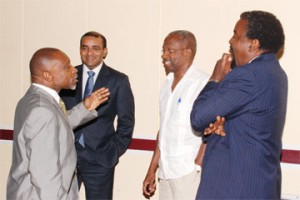By Miranda La Rose
 The local private sector can benefit from several opportunities including trade in goods and services; use of the natural environment for filming; value-added on fishery products, organic fruits, and knowledge in engineering and architecture.
The local private sector can benefit from several opportunities including trade in goods and services; use of the natural environment for filming; value-added on fishery products, organic fruits, and knowledge in engineering and architecture.
Caribbean Regional Nego-tiating Machinery (CRNM) Private Sector Liaison, Lincoln Price, speaking at the Guyana Bank for Trade and Industry (GBTI) business forum said Spanish businessmen felt Guyana was a good location for filming in a natural environment with its jungles.
The forum, held under the theme ‘The Cariforum/EU EPA – The Challenge to Transform’ at Le Meridien Pegasus yesterday attracted wide representation from the local business community. Speaking on the subject of transformation of the private sector in relation to the Economic Partnership Agreement (EPA) between Cariforum and the European Union (EU), Price said Sweden was interested in importing value-added fish products – and while Guyana did not export these products, it was an area that could be developed.
Export of organic fruit all across the European Union, he said, was another big deal Guyana could cash into. However, he noted that just labelling a product organic did not make it so, since the product would be rigidly inspected.
Meanwhile, President Bharrat Jagdeo, who also addressed the forum, reiterated his opposition to the EPA stating that had it not been for the threat of Guyana facing tariffs under the Generalised System of Preferences (GSP) it would not have subscribed to the EPA. “Had it not been for that I would not have signed on. I still hold that view today,” he said.
The EPA is scheduled to be signed between the EU and Cariforum – Caricom countries and the Dominican Republic – next month in Barbados.
In his presentation on who could immediately benefit from the EPA, Price said Guyanese architects and engineers could also provide skills in the construction industry in Jamaica where the Spanish were investing in the hotel industry. The Spanish investors, he said, were encountering problems getting building permits and understanding how the Caribbean builds. They are looking at joint ventures between Spanish and Caribbean architects and engineers who understand the Caribbean planning and building systems.
He said there were opportunities for creative industries such as in the areas of dance, theatre, book publishing, and music. While this might prove challenging and require careful planning, he noted that persons outside Cariforum were penetrating the EU market. “Other persons from other vulnerable markets are creating this market in Europe. We have to understand how to penetrate this market,” he said.
According to Price, the EPA was not a magic document and he urged business leaders to take advantage of trade shows and business missions planned for this year and in the future. He noted that EU funding was being provided for 30 persons from Cariforum to the business forum in Brussels in September and funding was available for another 100 persons for a business summit in Trinidad and Tobago in November.
For the rest of the year, he said, there were over 2,000 trade shows planned for Europe.
To access these opportunities, Price said, businesses needed to liaise with regional and national private sector, manufacturers, commerce and industries’ organisations including the Caribbean Association of Industry and Commerce (CAIC).
He advised service provid-ers to join professional associations because they would be the bodies to negotiate for the recognition of skills certificates to be recognised in Europe. Guyana, like Jamaica, he noted allows for one-man companies.
In opening remarks, GBTI Chief Executive Officer, Radhakrishna Sharma said the bank, noting the controversy in relation to the EPA, took a conscious decision to have the forum look at the modalities regarding its implementation and operation.
“It is important that we do this since we cannot have our business people left behind in terms of recognising the business and trade opportunities that are now open to them,” he said.
President Jagdeo then said he hoped that all views were accepted without disparaging comments for those who differ significantly. He said he noted in the Caribbean that when leaders spoke, mendicancy and a dependency syndrome seemed to characterise some of the more brilliant minds.
Begging to differ, he noted that some academics, who have spent a long time in the development stream, have expressed concerns that should not be swept under the carpet.
He said he had made clear Guyana’s position several times that had it not been for the December 31, 2007 deadline looming for an EPA and Guyana facing the threat of the GSP “we would not have subscribed to the agreement.”
He said rather than leaders in the region defend publicly something that many privately expressed concerns about; they did otherwise, which was disingenuous.
“Whatever its formulation, we would have to live with it,” he said adding that with or without the EPA Guyana and the region had to undergo a rapid process of transformation because of changes in the global environment.
He said there were those who were supportive of the EPA and those who felt that the EPA would bring greater hardships and challenges to the business community, which could result in many going under. Jagdeo said he was not speaking from a technical point of view but from a political perspective.





